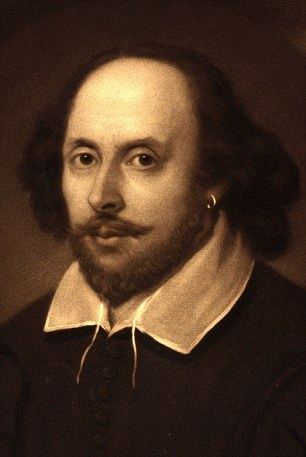英国阿伯里斯特威斯大学的研究人员表示,被世人仰慕的文学巨匠莎士比亚其实还有不为人知的一面:他曾是一个“无良商人”,而且还是逃税份子。研究人员查阅文档后发现,莎士比亚曾是一个有钱的地主,在欧洲饥荒期间他曾以高价出售囤积的粮食,且因逃税而屡次被告上法庭。研究人员称,莎士比亚尽其所能“逃避税收,从别人的消费中将个人收益最大化,在创作有关弱势人群的文学作品的同时搜刮他们的钱财。”研究人员指出,因为当时没有版权概念,莎士比亚完全没有意识到自己的作品也能带来收入;通过合法和非法的商业活动,到1613年莎士比亚已是当地最大的地主,并在当年宣布退休,而他的工作生涯仅为24年。

 |
|
William Shakespeare was a 'ruthless businessman' and tax dodger, researchers have claimed. |
It sounds like the sort of character who would have been deeply unpopular in one of his plays.
William Shakespeare was a 'ruthless businessman' and tax dodger, researchers have claimed.
Although he wrote plays that championed the rights of the poor and the needy, archived documents show the playwright was actually a wealthy landowner repeatedly dragged before the courts and fined for illegally stockpiling food and threatened with jail for evading taxes.
He 'stored grain, malt and barley for resale at inflated prices to neighbours and local tradesmen' at a time when Europe was suffering famines, the academics said, and channelled the profits into land purchases.
They added that Shakespeare did all he could to 'avoid taxes, maximise profits at others' expense and exploit the vulnerable – while writing plays about their plight'.
And his approach of 'combining both illegal and legal activities' meant he could retire after a working life of only 24 years.
Researchers at Aberystwyth University carried out an academic study looking into Shakespeare's 'other life' as one of Warwickshire's biggest landowners and have uncovered the less than savoury side to Britain's greatest playwright.
The allegation he exploited famine has also led to suggestions that his Coriolanus, for years regarded as a plea for the starving poor, was in fact his way of trying to expunge a guilty conscience.
Jayne Archer, a researcher in Renaissance literature at Aberystwyth University, said in the Sunday Times: 'There was another side to Shakespeare besides the brilliant playwright — as a ruthless businessman who did all he could to avoid taxes, maximise profits at others' expense and exploit the vulnerable — while also writing plays about their plight to entertain them.
'Shakespeare is remembered as a playwright, but there was no copyright then and no sense that his plays could generate future income.
'That drove him to dodge taxes, illegally hoard [food] and act as a money-lender.
'He had two surviving daughters and would have seen himself as providing for them, but he was acting illegally and undermining the government's attempts to feed people.'
Coriolanus depicts a famine created and exploited by rich merchants and politicians to maximise the price of food and includes the lines: 'They ne'er cared for us yet: suffer us to famish, and their store-houses crammed with grain.'
It has now emerged that as Shakespeare wrote the play at the height of the 1607 food riots, he was himself hoarding grain.
As one of the biggest landowners in Warwickshire, he was ideally placed to push prices up and then sell at the top of the market.
Ms Archer worked with Richard Marggraf Turley, a professor in the department, and Howard Thomas, a professor of plant science, to study Shakespeare's life as a businessman and owner of arable farmland and pasture at a time when Europe was suffering famines.
They found documents in the court and tax archives showing he was repeatedly dragged before the courts and fined for illegally stockpiling food and was threatened with jail for evading tax payments.
In a paper, the academics wrote: 'Over a 15-year period Shakespeare purchased and stored grain, malt and barley for resale at inflated prices to neighbours and local tradesmen.
'In February 1598 he was prosecuted for holding 80 bushels of malt or corn during a time of shortage. He pursued those who could not pay him in full for these staples and used the profits to further his own money-lending activities ...
'Profits were channelled into land purchases. He also acquired tithes on local produce, including "corn, grain and hay", allowing him to cream off the profits from others' manual work.
'By combining both illegal and legal activities, Shakespeare was able to retire in 1613 as the largest property owner in his home town, Stratford-upon-Avon. His profits — minus a few fines for illegal hoarding and tax evasion — meant he had a working life of just 24 years.'
Shakespeare's experience as a rich landowner at a time of famine may be reflected in plays such as King Lear, which depicts an ageing monarch trying to divide his lands, and the food they produce, between his daughters.
Professor Jonathan Bate, the Shakespeare scholar and provost of Worcester College, Oxford, said Archer and her colleagues had performed a valuable service in setting Shakespeare's work in the context of the famines and food shortages of the period.
(Source: dailymail.co.uk)
相关阅读

(中国日报网英语点津 Helen )